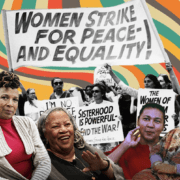Capitalist Feminism is the reason race matters for us all – Talya Scott-Mason.

“The unification of feminism and capitalism works to further exclude women of colour by reinforcing racist ideas of power and social capital”
Contribution by Talya Scott-Mason.
Even after women moved into the workforce, ideas of toxic masculinity and the dog-eat-dog attitudes of the men within them have stood the test of time. In part, this is because of the irresistible pull of financial success that is often tied to both capitalism and patriarchy. It wasn’t until the 1980s that competition and willingness to ‘climb the ladder’ became indicators of both drive and success for women, too; many of them only joined the external workforce due to the success of second-wave feminisms. At face value, competitiveness and the drive to financially look after oneself above all else seem to be positive traits; who else is more responsible for a person than themselves? However, the knowledge that not everyone starts on the same playing field contributes massively to our capabilities, motivation, and ultimately, our role in the capitalist system.
For black women, this has been clear since the emancipatory social justice movements of the 60s. Since men have historically been understood as primary breadwinners, masculine workplace cultures have become the norm to the point where femininity is still ostracised and demeaned. In the past, this meant women taking on stereotypically male traits in the workplace. The rise of social media platforms such as Instagram has meant that feminist discourse and narratives have been reintroduced into the mainstream. Femininity and feminism are now brushed with rugged individualism, competition, and those stereotypically masculine traits often thought to disappear with the “Golden Age” of the 1950s. Women are now encouraged to live for themselves and get the coin at any cost and move up into higher-paid roles. But why? More subtle is the phenomenon of capitalist and feminist unification. Social movements become inundated with capitalist rhetoric and beliefs, encouraging workers from all parts of society to grind non-stop in the name of capital. This is not to say financial security should be disregarded; in fact, ensuring a stable future for BIPOC should be paramount. However, it is crucial to understand how the capitalist system and society work against such bodies to control profit.
“Women are now encouraged to live for themselves and get the coin at any cost and, as a result, are moving up into higher-paid roles. But why?”
Given the racial advantages and privileges afforded to white people across the world and the success of mainstream feminism in aligning with capitalist values, some are more able to identify and work alongside capitalism. The unification of feminism and capitalism in practice works to further exclude black women and women of colour by reinforcing racist ideas of power and social capital. Where white women often hold the mic in terms of feminist thought and ideals, Kathy Miriam attributes neoliberal capitalism, ‘its media Moxy and popular reception [which] demonstrates the extent to which… feminism functions like a product placement ad for capitalist patriarchy’ to its reception in the mainstream.
“mirroring patterns throughout history, social justice movements trailblazed by black women are soon co-opted and profited from by those in positions of power.”
Mirroring patterns throughout history, social justice movements trailblazed by black women are soon co-opted and profited from by those in positions of power. Often, this occurs to commodify increasingly popular sentiments, sentiments that usually come packaged in aesthetically pleasing slogans or under auspicious handles. This is where convergences in capitalism and mainstream feminist thinking arise. Typically middle-class white women who have better access to positions of power use their proximity to white male patriarchy to subconsciously undermine true feminist movements. Instead, the subconscious yet swift alignment of feminists to racist capitalist beliefs has transformed the mainstream movement into a more insidious tool to further capitalism in the West and beyond.
The bringing together of capitalist and feminist ideals such as individualism and economic opportunity popularised amongst feminists during the 60s and 70s. Opportunities to confront and change legal policies often came at a price and eventually resulted in the fragmentation and exclusion of non-white feminists from the movement. Unfortunately, this dynamic continued until mainstream feminism almost came to mirror capitalist and patriarchal values in work and broader society. Mainstream feminists once ignored the calls for intersectionality and racial equality. The voice given to contemporary black activists by social media today briefly made enough noise to disrupt understandings of what has come to be understood as “white feminism.” This has, however, also made the feminist movement and its discontents ever more commodifiable. Once again, the erasure of activists of colour from discourses has resulted in a failure to wholly acknowledge the contributions and positions of black women and women of colour within the movement.
Despite them being active on various political fronts, many activists argue that the fragmentation of racial identity in feminist movements continues in the discourse today. Mainstream feminism still largely ignores the struggles of intersecting oppressions, especially race and class, which coincidentally, are the critical identities that capitalism continues to exploit and profit from. The platforming of a small minority of white middle-class women has facilitated the rise of capitalism’s friendly face. Notable activists such as bell hooks argue that as this continues, the consistent and longstanding ‘failure of feminism to interrogate race means that resistance strategies will often replicate and reinforce the subordination of people of colour’ throughout the world.
Contribution by Talya Scott-Mason.
Check out the GUAP Arts & Culture section, to discover new art, film, and creative individuals.

